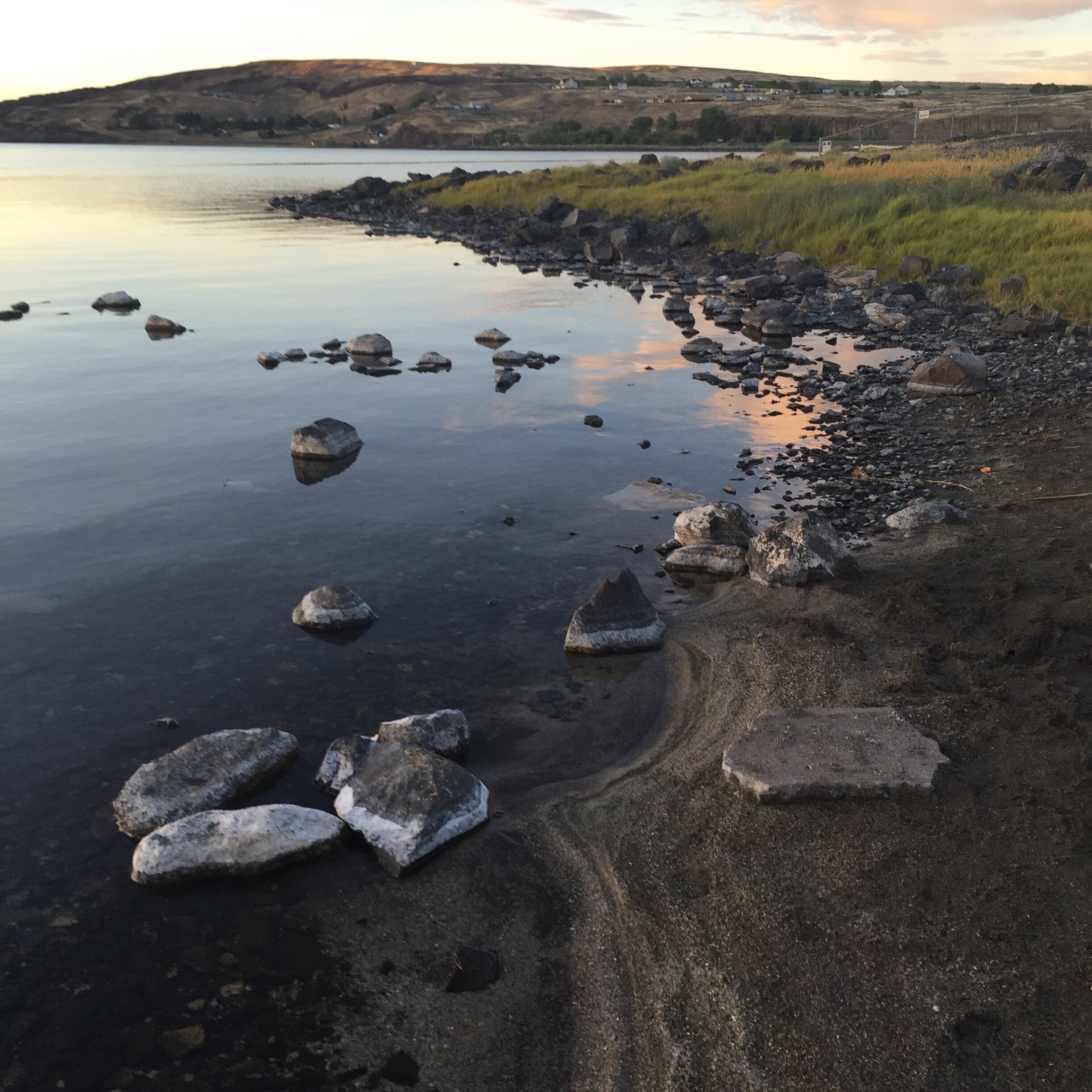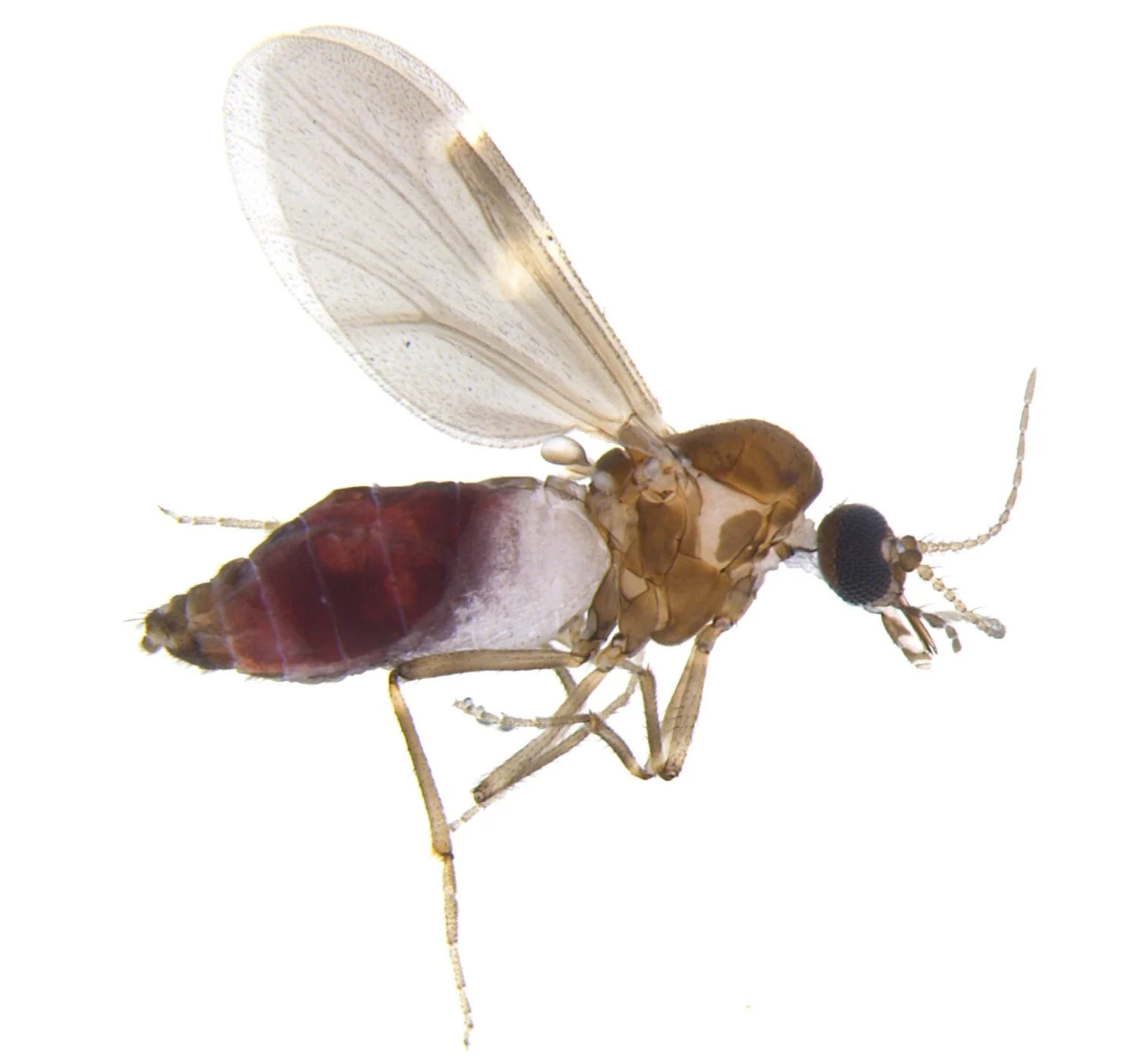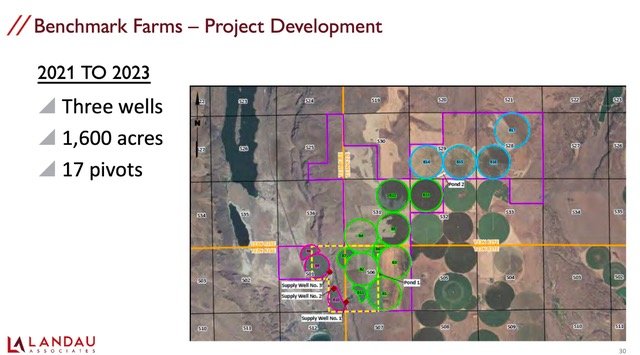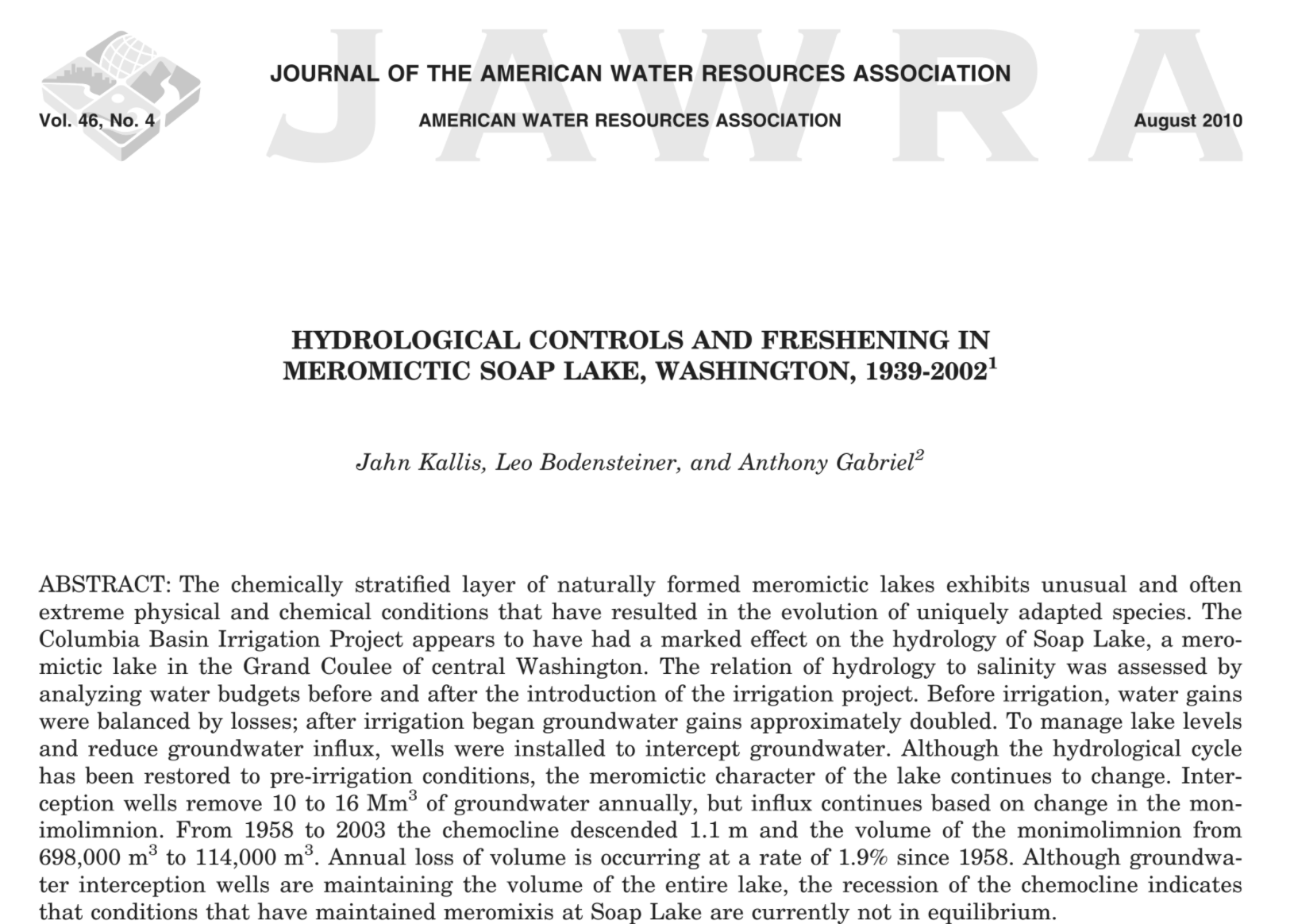
Soap Lake Conservancy
an outstanding resource water
Join us in saving our lake.
The Conservancy’s mission includes working toward restoration and preservation
of our unique meromictic mineral lake ecosystem.
Grant County, Washington State, U.S.A
Follow us on Facebook
-
Soap Lake is known to those who have gathered here for centuries as Lake Smokiam. This ecologically unique and culturally significant ecosystem perpetually attracts people from diverse cultures. Many people attribute medicinal value to this alkaline water as “healing water”, and visit to heal physical ailments and their spirits. The water, oil, and mud are purported to heal physical ailments and the spirit.
One of the highest salt and mineral concentrations, as well as diverse mineral profiles, of any lake in the world. Like the Dead Sea, the high mineral content of the lake increases in buoyancy.
The water also contains ichthyols, an oil-like substance sold over the counter in Europe to treat infections and abrasions. The ichthyol in Soap Lake water and mud is a sulfur-rich shale oil that was formed by the decomposition of copepods (and possibly other animal and plant material) thousands of years ago and is now part of the sediment at the bottom of the lake.
The alkalinity of the lake is similar to that found on the moons of Jupiter. Because of this, in 2002 the National Science Foundation (NSF) awarded a grant to researchers from Central Washington University to study the lake to learn about the possibility of life on Mars. The NSF recognized the unique and remarkable salt and mineral profile of Soap Lake and declared it a rare Microbial Observatory for the 5 years it funded biological research. (edited from Wikipedia, 2021)
Soap Lake is known as the šmokíəm ("healing waters") of the Moses-Colombia tribe. Many tribes gathered here for thousands of years for the relaxation and healing properties of alkaline water, oil, and mud. This ecologically unique and culturally significant ecosystem continues to attract people from different cultures FROM AROUND THE WORLD.
January 2025 -
Below is a short and lighted edited history of the lake and its minerals from Soap Lake resident and Soap Lake Conservancy member, Bonnie Holt. We value her vast knowledge about the lake and the history. This is from her research on Soap Lake and from her lifetime of experience living here.
The opinions expressed are Bonnie Holt’s and not the Conservancy's.
Mineral Content History by Bonnie Holt
The lake's mineral content has been intentionally depleted since the arrival of white settlers in the Columbia Basin. The first recorded building on the lake's shore and floodplain was constructed in 1905. A 1922 map shows the lake’s elevation near the Thorson Mineral Plant. Daily, the town of Soap Lake, Thorson's Hotel, and Soap Lake Products Company, private spas, and sanitariums extracted thousands of gallons of the mineral-rich water.
A 1936 analysis of the lake’s water, one of the earliest recorded tests, is documented on our website. These tests, conducted over time, reveal a consistent reduction in the lake's mineral content. The Bennett Studies on saline lakes provide a detailed description of the lake and its mineral composition during the 1920s.
Soap Conservancy's mission is the restoration and preservation of Soap Lake, a natural mineral lake. We are dedicated to actively improving the vitality of the Soap Lake area through education and promotion of the therapeutic, recreational, and cultural qualities of Soap Lake.
As time passed, as many as 50 hotels, motels, auto courts, and tourist facilities offered mineral water in every room. The city had a reservoir for storing mineral water, which was pumped to a holding tank and then gravity-fed to businesses and sanitariums. After the original sanitariums burned down, the McKay Hospital was built in 1936 by the state, equipped to provide daily soaks for every patient. A 1942 map from the fire department shows that the lake’s elevation had receded to 1076 feet, well below the former East Main (then known as Lake Avenue). Despite the loss of the sanitariums, residents were relieved that the basements of City Lake Avenue no longer flooded.
By 1950, the city began developing the west side of the lake. Engineers, doctors, and government officials purchased lakeshore properties and built homes above the 1076-foot elevation. They and the city agreed that 1078 feet would be the lake’s high-water mark, though historical documents showed the lake’s elevation had once exceeded 1083 feet. A graph from 1955 shows a significant depletion of the lake’s mineral content since the 1936 test.
During the 1950s, when water started flowing into the canal, the aquifers began to rise after a drought, as documented by the Bureau of Reclamation. Dr. Tommy Edmondson, a renowned limnologist, was hired to study the lake’s balance over the next 50 years. His work records the Bureau of Reclamation era and the lake’s ongoing depletion. The misconception that the Bureau's canal water caused the lake's rise in the 1950s led to a belief that the water level must be maintained at 1076 feet to protect homes along the west shore. This misunderstanding persists today.
Throughout the 1950s, large-scale water extraction from the lake continued. The Thorson’s building was used to pump water for mineral salts production, and the town reached its peak in mineral water usage for tourism, healthcare, and residents. The Thorson's Salt Plant ceased operations in the 1980s, and by 2020, the city began abandoning the rusted pipes that delivered water throughout the town. Another significant pumping of lake water occurred in 1998 when the lake began to rise again due to an elevating aquifer. A contract for the sale of mineral water was granted to the Soap Lake Spa and Resort, which continues to extract water from the lake.
In 1999, the Soap Lake Conservancy initiated a scientific study of the lake, with the first seminar on the geology and the lake held at Soap Lake DH Elementary School in 2002. Unfortunately, the $200 attendance fee limited participation, but the event was covered by newspapers. The study continued until 2005, and a second seminar was held at Masquers Theatre. Despite another $200 fee, few attended, including me. The Soap Lake Conservancy conducted additional mineral count studies from 2018 to 2024, continuing the work started by Dr. Leo Bodensteiner and others during the Saline Lakes Study.
Our recent efforts led to the designation of Soap Lake as an Outstanding Resource Water, finalized in December 2023, granting it state and federal protection against further human interference. A comprehensive and accurate graph of the lake’s mineral reduction is available on the linked spreadsheet below. It scientifically documents the depletion despite the Bureau’s efforts to pump underground water to prevent it from entering the lake. The city’s direct pumping from the lake ended in 2022 and permission was given to Soap Lake Natural Spa & Resort to continue pumping the lake's mineral water for use by guests there.
measurement is mg/L
The deepest waters of Soap Lake has very likely not mixed with the upper layer for at least 2,000 years. That is among the longest documented stratification of any lake on earth. SLC is deeply concerned about the bottom layer which is the Monimolimnion Layer. (profile graphic courtesy Kovach Architects)
Learn More about the Lake
A unique mineral lake with a long history in the middle of Washington state, USA. The Conservancy takes a science-based approach to preservation and restoration.
We acknowledge
Soap Lake Conservancy recognizes that šmokíəm (Soap Lake) is located in the traditional škwáxčənəxʷ or Moses Columbia Tribe. We acknowledge that this is unceded land and water of the Confederate Tribes of the Colville Reservation (CTCR): Chelan, Chief Joseph Band of Nez Perce, Colville, Entiat, Lakes, Methow, Moses-Columbia, Nespelem, Okanogan, Palus, San Poil, Wenatchi (CTCR link)…. Along with other tribes of the past and present. We value our partnership with the Confederate Tribes of the Colville Reservation on our Outstanding Water Resource Water Application.
HISTORY OF SOAP LAKE
“Indians camped here each summer for many centuries. They gathered food, raced horses, gambled, and used the healing waters of Soap Lake. The Indian camp was across the lake at the popular (sic) trees. Their race track was near the hospital. The famous Cariboo cattle trail, used from 1859-1868 passed just east of here. Pioneers settled here about 1900. The first store was built in 1904 by Carl Jensen. Soap Lake platted in 1908, incorporated in 1919. Soap Lake has been called Cottage Lake, Salome Lake, Siloam, and Sanitarium Lake. Soap Lake is noted for its annual July Fourth fireworks celebration.”
Grant County Historical Society
Exciting News from Soap Lake Conservancy! (July 2024)
We're thrilled to announce that we've been awarded the Smokiam Conservation Project grant from the Columbia Basin Foundation! This grant will enable us to continue to collect, preserve, and share important documents about the unique ecosystem of Soap Lake, including legal, historical, and scientific resources.
Our goal is to make these materials accessible to historians and researchers worldwide, helping to preserve our region's rich history and ecological significance. This project is a vital step in continuing our mission of education and conservation.
The grant allowed us to purchase a high-quality scanner and hire someone to digitize and organize these documents. We will start by collecting information from SLC members and then reach out to the broader community, including the city library, to gather additional resources. We hope to have a student from Soap Lake work with us on this project, making it a true community effort. The Soap Lake Community Center has generously donated space to house this project.
Thank you Columbia Basin Foundation for supporting and believing in our mission. Stay tuned for updates as we embark on this important project!
SLC members Bonnie Holt and Leslie Taylor with the new scanner
SUCCESS!
Thank you everyone for helping Soap Lake become an Outstanding Resource Water! (Dec. 19, 2023)
Confederated Tribes of the Colville Reservation (CTCR) and Soap Lake Conservancy applied jointly via the Washington State Department of Ecology for this special designation.
Outstanding resource waters are identified as having exceptional water quality, ecological and recreational values, or unique attributes that distinguish them among state waterbodies and warrant special protection. This is the first time Washington has assigned the highest level of protection to a waterbody under the Tier III Antidegradation section in our water quality standards.
Any new or expanded source of pollution to a Tier III(B) ORW cannot cause a measurable change in water quality. This level of protection would place extra requirements on new or expanded point source discharges to ensure pollution from wastewater is kept to a minimum. For nonpoint sources, this designation would require that certain Best Management Practices are used to limit pollution from runoff to below measurable levels where total elimination is not feasible.









